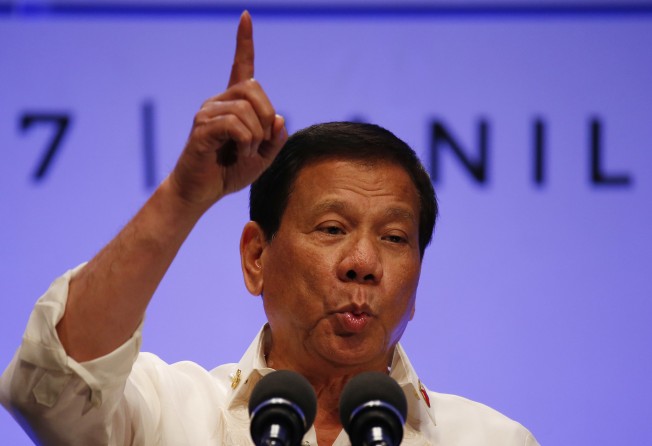Duterte’s joint energy plan for South China Sea may test Asean’s unity
Manila’s bid to edge closer to Beijing could deepen divisions in the regional bloc over how to deal with China

Manila’s plan for joint energy exploration with Beijing in the South China Sea could be a test of unity for the Asean regional bloc as it grapples with an increasingly assertive China.
Several members of the Association of Southeast Asian Nations have privately expressed concerns over Philippine President Rodrigo Duterte’s plan, according to observers. They say Manila’s bid to edge closer to Beijing economically could deepen divisions in the group over how to deal with China.
The comments come amid reports that the Philippines will explain Duterte’s plan for joint energy ventures and reassure the other nine Asean members at a meeting of the bloc in Manila next week.
“It will not be a unilateral action from the Philippines because the premise of the president is peace and stability, and unilateral action by anybody leads to destabilisation,” Philippine Foreign Secretary Alan Peter Cayetano was quoted by Agence France-Presse as saying. “There will also have to be consultations with the whole of Asean because we want to keep the stability there.”
The Philippines won a landmark case against China last year, when the Permanent Court of Arbitration in The Hague invalidated Beijing’s claim to sovereignty over most of the South China Sea.
But Duterte has since set aside the longstanding dispute and instead begun courting Beijing in exchange for billions of dollars in trade and investment.
It’s a strategy analysts say has left the other Asean countries worried about how to deal with China’s aggression in the contested waters.
Chen Gang, assistant director of the East Asian Institute at the National University of Singapore, said it was unlikely the other claimants – including Vietnam, Malaysia and Brunei – would follow Manila’s lead. “The Sino-Philippine joint energy cooperation plan is still at an initial stage,” he said. “Joint drilling for resources will definitely put pressure on the other Asean countries, especially rival South China Sea claimants.”
Beijing has reacted positively to the plan, which Chinese diplomats believed could be a model for other countries involved in maritime disputes with it.
But analysts believed Duterte’s plan could cast a shadow on the Asean meeting, and create division between the Philippines and other members over their stance on China.
Pham Hai Lien, a researcher at the Diplomatic Academy of Vietnam, under its foreign affairs ministry, said Hanoi would discuss joint drilling with Beijing only after the sovereignty issue was solved.
“The maritime disputes between Vietnam and China should be solved according to international law. Pending a final resolution, Hanoi is unlikely to discuss any cooperation plans with Beijing – a move seen by Vietnamese as treason,” she said.
Vietnam is among the most vocal Asean countries challenging China’s claims of sovereignty to most of the South China Sea.
The BBC reported this week that Vietnam had been forced to suspend drilling operations in an area about 400km off its southeast coast because of Beijing’s threats to attack Vietnamese bases in the Spratly Islands.
Chinese foreign ministry spokesman Lu Kang said Beijing had indisputable sovereignty over the Spratlys, which China calls the Nansha Islands.
Last month, General Fan Changlong, vice-chairman of the Central Military Commission, cancelled a border defence meeting, signalling Beijing’s anger about Vietnamese activity in the South China Sea.